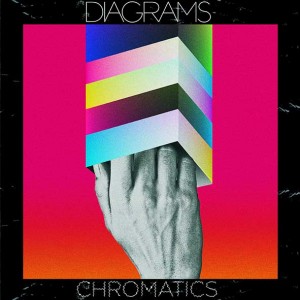Diagrams is the latest project of Sam Genders, previously of Tunng, but for me Chromatics is sharper and more interesting than Tunng’s more diffuse work. ‘Phantom Power’ starts out jaunty, gently articulate, all Belle-&-Sebastian-eqsue, rattling along like a red bicycle with a bell on it, then a hook in the middle makes the song happen, suddenly: “I need a little phantom power” – as if a small vortex opens up – I could listen repeatedly just to re-encounter that knot in the rope.
So this is a thoughtful, pleasing, mature album, appealing to the grizzled-contemplative-dad in me (and I’m 28-years-old and female), briefly reminiscent of Elbow’s recent work, Steve Mason, Pulp, Belle & Sebastian, while having its own stamp. In ‘Gentle Morning Song’ Genders’ love of Helen Mort’s poetry shows through, a faithful interest in the street outside: “The world isn’t waiting for us anymore, not like when we were young…” This is where Pulp comes in too; there’s something Jarvis-Cocker-like in the “drunken girls and the sweetling thugs” (and something a bit camp about putting ‘thug’ and ‘sweetling’ together), and a great swell of harsher sounds in the conclusion. ‘Desolation’ is a glorious electro swirl, turning strobe lights on; the words get dramatically dark but the tune wants to dance.
Title track ‘Chromatics’ is much quieter, putting more pressure on the lyrics (“wear our true hearts like tasteless old ties”, that’s quite clever). Genders chooses to risk earnestness and it works, sweetly. ‘You Can Talk To Me’ is the least dynamic song musically, but wears its heart on its sleeve.
‘Shapes’ is exploratory and adventurous, ending in the clouds with a solo female voice; ‘Dirty Broken Bliss’ is fun, like a love story set inside an arcade game. ‘Serpent’ is quietly epic: “gonna set myself on fire, hold aloft the flaming sword”, sung with a minimum of brimstone, floating over a London cityscape. ‘The Light and the Noise’ is indefatigably cheerful, and ‘Brain’ is all about how “beautifully fragile we are”.
All this conscious optimism could easily sink into platitudes, and sometimes does – the final song, ‘Just A Hair’s Breath’, gets a bit sickly sweet – but I like the drive behind it: that to acknowledge darkness and manage to stay cheerful is as interesting as misery, that it’s also work. There’s a subtly strong ambition in some of these songs, hiding under their soft fuzzy edges, those moments when they shift and sneak up on you.

